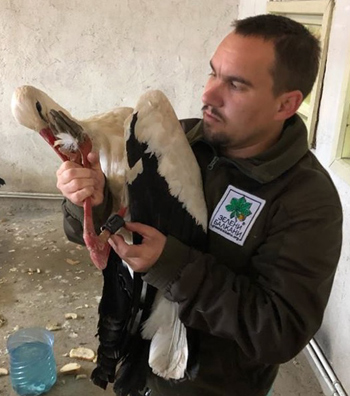Safet Halid from the village of Zaritsa in the region of Silistra has sheltered in his home five frozen storks, and his example has been followed by dozens of people who have rescued many distressed birds, accommodated them in their homes and even on their beds. Unlike the common practice, this piece of good news has reached thousands via social networks and media and has even captured the headlines.
Early in the morning doctor Rusko Petrov went on a tour of more than twenty villages where merciful people have rescued storks, taking them in their homes. About noon we found the doctor on the frosty road to the village of Zaritsa – together with a colleague of his from the Rescue Center for wild animals of the Green Balkans group in the city of Stara Zagora he has already paid visits to several villages.
 “We are now in the Municipality of Dulovo – we found here 22 storks and only one of them feels rather poorly, so we are going to transport it to our rescue center in a special automobile”, Rusko Petrov who manages operations at the center explains. “Before that we visited the region of Shumen where jointly with our colleagues from the Regional Inspectorates of Environment and Water (RIEW) in Shumen and Ruse we toured the villages of Kliment and Naum. We counted the total of 21 storks there – 19 in a good condition and two with broken wings that we also took to the center. Later we visited the village of Branichevo and we found 14 storks in a good condition and buzzard. We are now taking the buzzard to the rescue center, because it is very distressed.”
“We are now in the Municipality of Dulovo – we found here 22 storks and only one of them feels rather poorly, so we are going to transport it to our rescue center in a special automobile”, Rusko Petrov who manages operations at the center explains. “Before that we visited the region of Shumen where jointly with our colleagues from the Regional Inspectorates of Environment and Water (RIEW) in Shumen and Ruse we toured the villages of Kliment and Naum. We counted the total of 21 storks there – 19 in a good condition and two with broken wings that we also took to the center. Later we visited the village of Branichevo and we found 14 storks in a good condition and buzzard. We are now taking the buzzard to the rescue center, because it is very distressed.”
People have opened their homes and hearts for the storks and take good care of them. According to the vet though too much care frightens the birds, because they are wild birds and unaccustomed to human presence.
“We talked to many of the hosts and instructed them to leave the storks in rooms which they do not enter too often, otherwise the birds get stressed”, doctor Rusko Petrov explains. “Therefore we try to take most storks outside the homes and take them in one or two places in a village – most often in the village hall. It will be good if a mayor or proxy mayor takes responsibility of the storks, and if only one person visits them to bring food and water.”
The doctor has provided 420 kg of fish distributing the amount to host villages depending on the number of birds. He leaves enough food for a week – until the weather gets warmer and storks fly away.
Doctor Rusko Petrov explains that every year at this time of year there is snow in Northeastern Bulgaria, and storks are accustomed to surviving in adverse weather. This year the problem is due to the silver thaw in the areas of Dulovo, Silistra, Ruse and Shumen causing storks to get frozen and distressed. In such a situation they need help – and a few days of warmth and food before they are released. Therefore, had people not come to rescue, some of the stranded storks could have died.
Anyway, storks are not the only ones in trouble. The rescue center in Stara Zagora is full of patients in need of medical care and warmth – more than 250 vultures, pelicans, long-eared owls, barn owls, crows, herons, marsh harriers and buzzards. In the past three days alone the hotlines of the center received more than 300 calls about stranded storks.
“RIEW – Shumen and RIEW – Ruse have done their job in a competent and responsible way, because they have responded to every signal with visits on the spot”, doctor Rusko Petrov says in connection with online comments criticizing NGOs and government bodies. “They are constantly in contact with us and respond to every signal we give. They issue instructions to people how to act so that birds feel well in their homes. To recap, if society cares for biodiversity we should not leave the whole job to NGOs and RIEW. Citizens should be active too. After all, a state implies the citizens who live in a country.”
The people who host storks in their houses hope that the birds will make their nests over their chimneys. The benefactors however should not think that storks are ungrateful if they fly away. After all, storks need the most favorable habitat where they would raise their offspring.
English Daniela Konstantinova